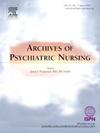青少年自我效能感、健康生活方式信念与数字游戏成瘾的关系:结构方程模型方法
IF 2.2
4区 医学
Q1 NURSING
引用次数: 0
摘要
目的探讨青少年自我效能感、健康生活方式信念与数字游戏成瘾的关系。方法本研究采用横断面设计,按照STROBE指南进行。这项研究是在南部地区本文章由计算机程序翻译,如有差异,请以英文原文为准。
The relationship between self-efficacy, healthy lifestyle beliefs, and digital game addiction in adolescents: A structural equation modeling approach
Aim
This study aimed to investigate the relationship between self-efficacy, healthy lifestyle beliefs, and digital game addiction among adolescents.
Methods
The present study was conducted using a cross-sectional design, in accordance with STROBE guidelines. The study was conducted with 276 students at a high school in a provincial center in the southern region of Türkiye. Data were collected from adolescents aged 14–17 between December 2024 and January 2025. Data were collected using an Individual Introduction Form with demographic details and three valid scales: The Self-Efficacy Scale for Children, the Adolescent Healthy Lifestyle Belief Scale, and the Digital Game Addiction Scale for Children.
Results
It was found that adolescents had moderate self-efficacy levels, above-average health belief levels, and were at moderate risk of digital game addiction. Self-efficacy was positively related to healthy lifestyle beliefs, while healthy lifestyle beliefs had a negative relationship with digital game addiction. The structural equation modeling (SEM) analysis confirmed the validity of the model with acceptable goodness of fit values. Self-efficacy was a positive predictor of healthy lifestyle beliefs with high explanatory power in adolescents.
Conclusion
This study reveals a significant positive relationship was observed between self-efficacy and healthy lifestyle beliefs, while a significant negative relationship was found between healthy lifestyle beliefs and digital game addiction. Self-efficacy was a positive predictor of healthy lifestyle beliefs with high explanatory power in adolescents.
求助全文
通过发布文献求助,成功后即可免费获取论文全文。
去求助
来源期刊
CiteScore
3.70
自引率
0.00%
发文量
131
审稿时长
160 days
期刊介绍:
Archives of Psychiatric Nursing disseminates original, peer-reviewed research that is of interest to psychiatric and mental health care nurses. The field is considered in its broadest perspective, including theory, practice and research applications related to all ages, special populations, settings, and interdisciplinary collaborations in both the public and private sectors. Through critical study, expositions, and review of practice, Archives of Psychiatric Nursing is a medium for clinical scholarship to provide theoretical linkages among diverse areas of practice.

 求助内容:
求助内容: 应助结果提醒方式:
应助结果提醒方式:


